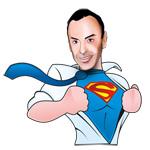
Hey, it’s JSE with another video blog for Super-Trainer. How is it going? All right. This video topic is about thinking big and getting bigger results and I think at one time or another, all of us and definitely including me have been guilty of not thinking big enough in whatever we want to do. But right now, I’m just talking about your business goals and your business accomplishments and here’s what I mean.
Sometimes, we – and I’m including me in this because I’ve done this too much in the past but no more. Sometimes, we think, “Well I’ll just do this little thing. It’s fairly easy. I can get it done pretty quickly and yield X as a result.” Instead of thinking in advance and well ahead and having some foresight to the greater scheme of things and saying, “If I plan a little bit more, if I take a little bit more time and if I believe more is possible, ultimately I will get a far greater result.”
So what are the benefits of thinking bigger and getting bigger results? A lot of different things. Now I’m just going to go through them as they come to top of mind.
Number one is that if you do something greater, you will probably have a greater sense of accomplishment so you have that internal frame of reference of, “Wow, I did something pretty cool,” and that’s always neat. It also helps solidify and establish yourself in the industry as someone who does big, cool things. So if you’ve created a new transformation program or workout, maybe you’ve opened a new gym or an extreme training center or whatever it is for you, rather than doing something small potatoes, it gives people the feeling that you’re doing something greater, that your contribution matters more and you’re a more significant player.
Now I’m not saying get over your head and spend too much money beyond what your budget is. That’s not what I’m saying. What I’m saying is do more and believe more is possible than perhaps you currently think is possible. Another thing about doing something bigger and then therefore being able to charge more for it and having a greater outcome for both you and your customer is that on these bigger projects, not always but frequently, you won’t have as many customers but they will be higher paying customers.
So what that means is that each item you sell, you make more money with but also I’m generalizing and I’m stereotyping a little bit. If people pay more money, generally those people are less of a pain in the ass as a client and customer. Think about it. People that nickel-and-dime you are kind of a pain frequently, right? But the people who have the financial means and the fortitude to get through something that’s bigger that you’ve created, generally are less of a customer service hassle; and because there are fewer people as well, you will have fewer people to service in addition to when the time comes servicing people for customer service support that are generally easier to work with.
Now I am stereotyping and I’m generalizing but over two decades of doing this and launching dozens and dozens of projects and programs, that tends to be the way it is. There are exceptions of course.
Another thing with thinking big and doing bigger things is that it keeps you focused and believe me, if you’ve been guilty of this, you’re thinking, “Yes, yes, yes. That’s me,” me too. I’ve done the same thing. So we talk about the bright, shiny light object. It’s kind of like the cat and you turn the flashlight on the wall and it’s all over the place. If that’s you, you have to stop that. Now there are definitely things that will come along that are advantageous to you that don’t take a lot of time and take a lot of effort and I’m not saying ignore all those. I’m saying be careful what you invest your time, your money and your effort into. If it is something that will not give you the best possible result, the biggest results, the most impact on the people you serve and the most impact on your business, well perhaps creating less work for you and your team but a greater return on your investment in time.
So in general terms, if you were to do four small projects, perhaps you should just do one big project and a real simple example of that is if you’re creating an information product. You go, “Yes. I’m going to make an audio program and I’m going to motivate people.” OK. That’s cool. I like those. So I’m going to do an ebook and I’m going to show people the 10 best abs exercises. That would definitely sell or be a great giveaway. I’m going to make an online video series that will do blank and people are going to be able to put it in their 1ShoppingCart or use Infusionsoft and be able to get it for $59. All right. Well, that’s good too and I’m going to offer some sort of coaching program. OK, that’s cool.
But what if you put it all together and you created a system out of the whole thing and it has more actual value, more perceived value, it’s bigger in scope? It will take longer to put together but it will keep you focused and it will put more money in your pocket and you will have less customer service issues probably because you’re just dealing with one person who’s getting all that information in one lump amount.
So thinking big goes with products or service, when you’re training or even how you are perceiving your overall career as a fitness pro; and everyone has different goals and it’s not up to me and it’s not up to any of the other experts here on Super-Trainer to determine your goals and your values or your dreams, your beliefs and what you think is possible for your career. That is solely up to you.
I invite you to consider this. Whatever you’re currently doing or whatever your current goal is, ask yourself, “Am I selling myself short? Am I thinking too small because I might be afraid of both the good and possibly the bad that could come out of something bigger and greater and better?” So are you selling yourself short out of fear of either success or failure? There are bumps along the way. But are you doing that and you’re not living up to your full potential?
So this has to do with products or service and the psychology of success and what you believe is possible and what T. Harv Eker, the author of Secrets of the Millionaire Mind – which I strongly suggest this book. It’s great. It’s basically your financial blueprint, what you believe is possible because if you have a governor in your mind that says, “I can only make $100,000 a year,” which is still a very respectable income and about three times higher than the industry average, that’s still a great income.
But what if you get a million dollar idea? By the law of self-preservation meaning that you will do anything to protect yourself, if you have a million dollar idea but you’ve already set a cap in your head, in your subconscious that I’m only worth or I only can do or my goal is only $100,000 a year, your brain at the subconscious level, because it’s programmed, will dismiss that million dollar idea as not being feasible because you’ve already programmed yourself to have a cap at $100,000.
Now that may seem like voodoo, witchcraft, woo-woo, poo-poo, whatever. I ran out of descriptive phrases. The point is, this stuff really works. This is really the way your brain works and oftentimes like if you go to an event or you read stuff on business success and people say it’s all in your mind and it’s mindset and it’s this and that and you’re like, “No, I need strategies, techniques, tactics. I want to know about Google, all that stuff,” all that is important; but if your mind isn’t in the right place first to think big and take the necessary steps and believe it’s possible and to reprogram the way you think about success, none of the other stuff even matters.
You can read books until you’re blue in the face. You can read every blog post, watch every video on SEO and writing headlines, all that stuff but if you don’t put your head in the right place, in the right frame of mind, it won’t work. It’s that simple and it sounds like a bunch of hogwash crap, like foo-foo stuff but it’s true. It’s true. I have never found an exception to that as long as I’ve been studying personal development and human achievement which has been probably longer than a lot of the people watching this video have even been alive. I’m that old.
All right. So that’s it. Think big. Achieve bigger, greater, better things and just take action. See it through. Test yourself. You know what? I was going to cut this off but I’m going to give you just a real quick example of what I did to condition myself to be able to do bigger things. I will be brief with this but back in 1993, I had already been racing bikes and mountain bikes and all that kind of stuff and I started getting into multisport.
I did some mountain bike triathlons. I did some short distance triathlons but I wasn’t really good at the longer distance triathlons and part of it was because I didn’t invest enough time to build a base and a foundation and I thought it was too lofty of a goal to do the Iron Man. It’s a pretty massive event but I set aside nine months to prepare for doing the Iron Man Triathlon. This was a long time ago, again back in 1993 and the reason I did it was because it taught me that I can do something that is bigger and better and more challenging and enduring than things I’ve done in the past.
Then that has become my new litmus test to determine what is possible because it’s very tough just to have to work that hard, to be that focused, that diligent and to give mind, body, spirit, financial obligation, family support and to be in that much pain, in that intensive pain all put together.
Everyone has their own goal. Maybe it’s a marathon for someone else. It doesn’t matter but I’m just saying that was my personal story. But after I did that, I thought, well pretty much anything is possible because nothing can hurt this much. I’m probably not going to have to invest this much effort into anything again. So maybe you could challenge yourself physically in a way to raise the game to where you can believe other things are possible and then achieve them.
All right. That’s it. I’m JSE signing off. Hope I didn’t go off on too much of a tangent. All right. Thanks a lot.
Dr. John Spencer “JSE” Ellis
www.JohnSpencerEllis.com

